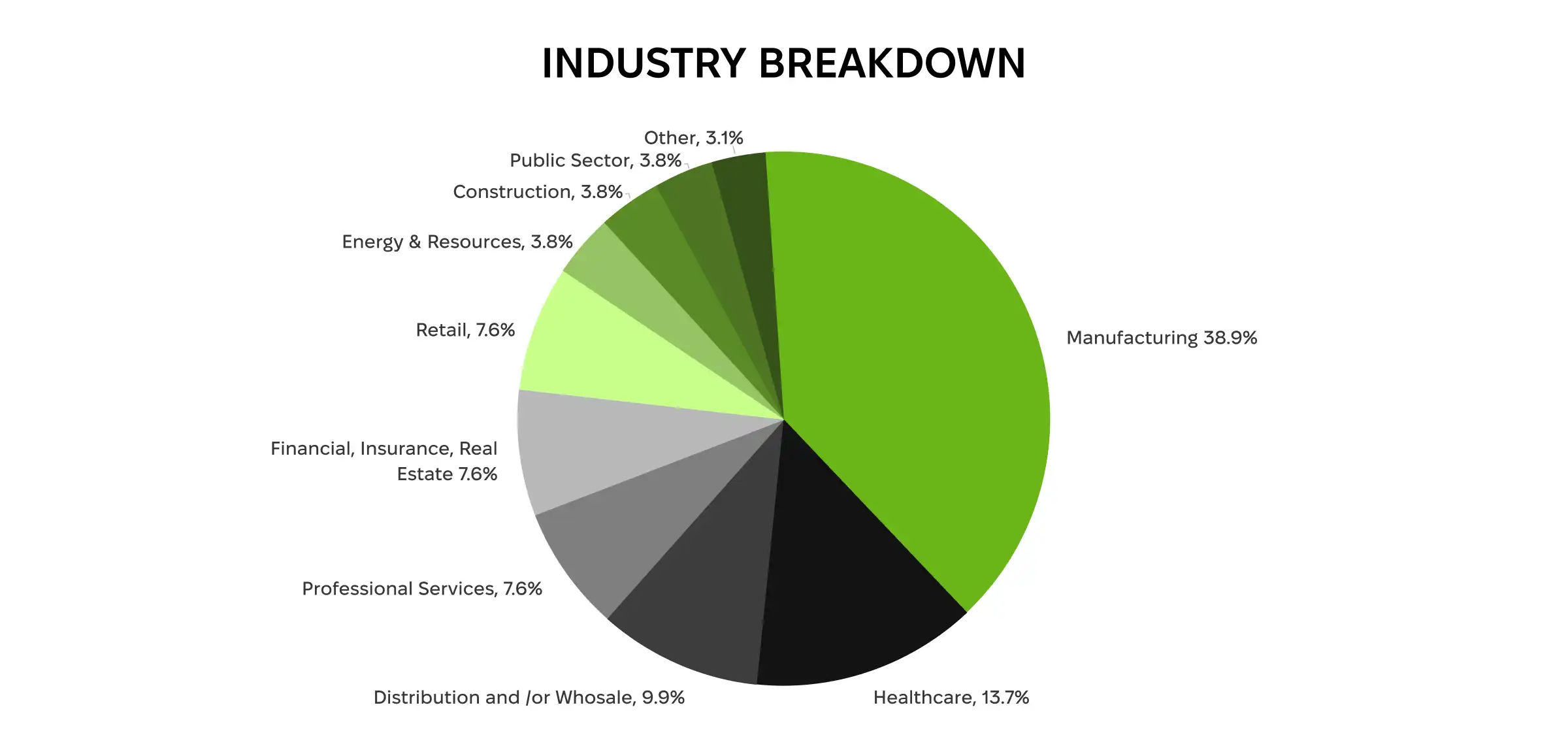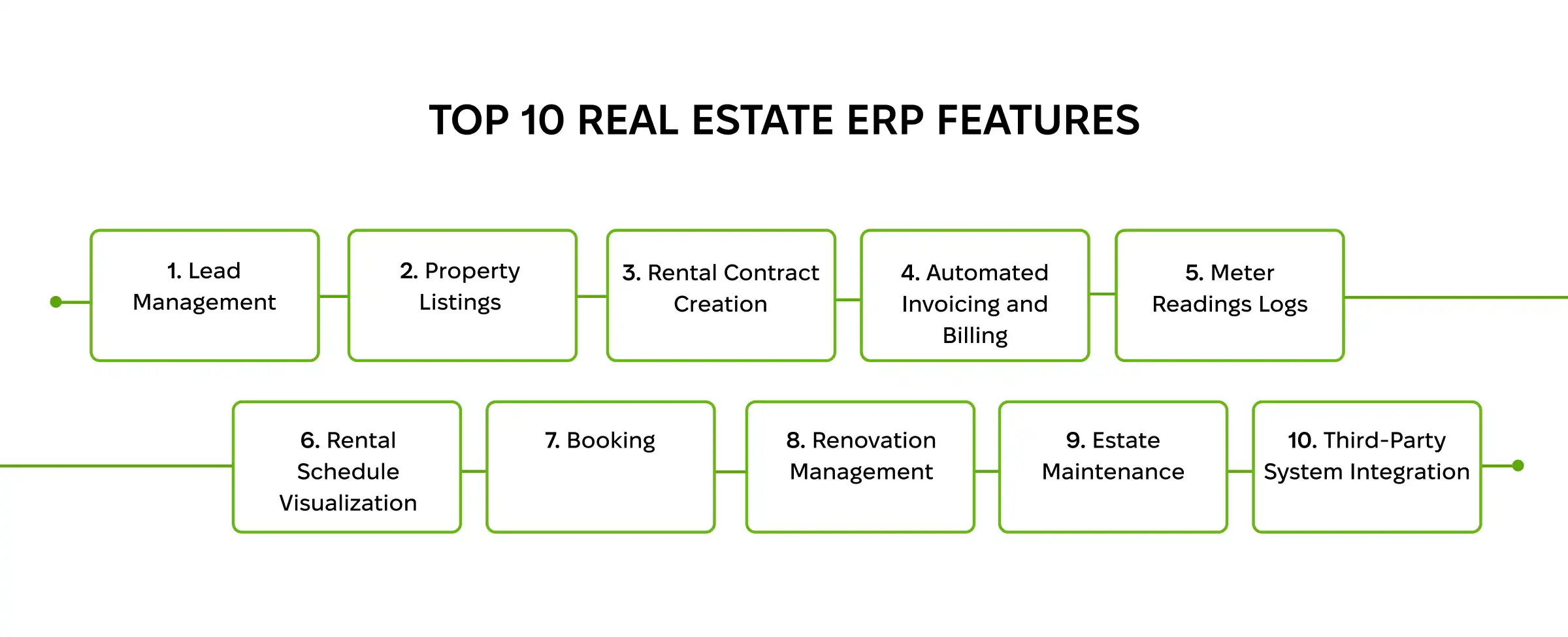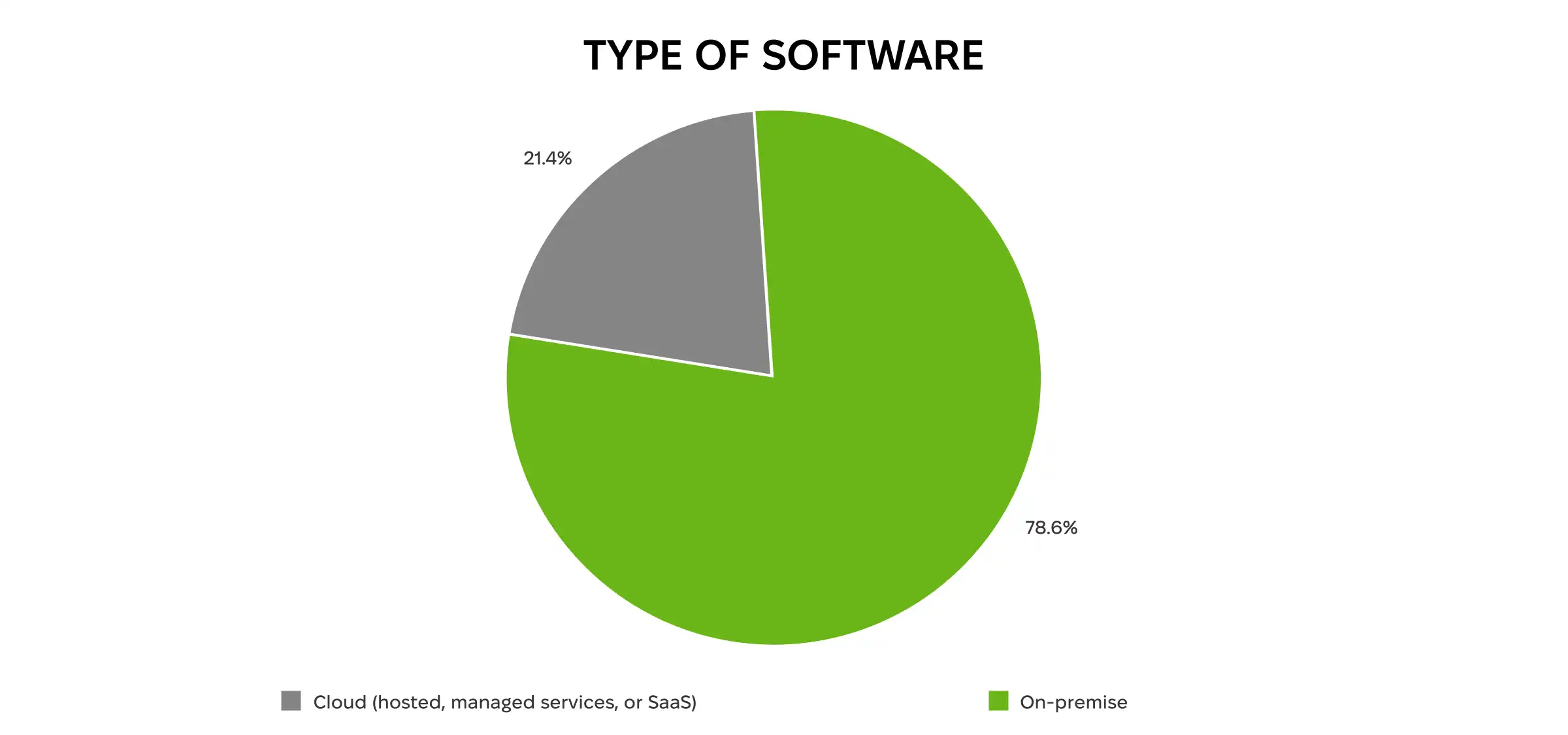Real estate operations are often tangled in disparate systems. Implementing ERP software can help manage tasks more efficiently and keep track of all data in one place. With the right tech partner, you can either build a custom system or adapt a ready-made one to your unique workflows, business model, and data structure.
Let’s say your day starts with a dozen urgent demands. There’s a tenant’s maintenance request, an investor asking for a profitability report, and three different spreadsheets that refuse to agree on the current cash flow. We can list even more processes, but you’ve already got our point.
Juggling all of the above often means having to dig through emails, spreadsheets, handnotes, or disconnected software just to get day-to-day work done.
The good news? You can bring these operations and data into one place with ERP for real estate. In fact, 7.6% of real estate companies surveyed by Panorama Consulting Group have already adopted enterprise resource planning software. That number may seem small, but it’s growing fast as more businesses realize how much easier life gets when everything runs through a single platform.
In this article, we’ll explore why ERP software is becoming a must-have for real estate companies and what features truly make a difference. We’ll also discuss which solutions to consider, whether custom or ready-made ones.
Why Adopt ERP for Real Estate Businesses?
If you’re unsure whether the implementation of ERP software for real estate is truly worth the effort, it’s absolutely natural. Change is hard and overwhelming. However, there are several reasons ERP might be exactly what you’re missing:
Helicopter View of All Operations, Clients, and Leads in One Place
Instead of using separate tools for each process, an ERP system allows you to connect everything in a single dashboard. You get a complete view of property booking, renovation, inspection, lead management, invoicing, billing, and many other operations. And when everyone’s looking at the same data, that means fewer mistakes and better decisions.
Scalable Capacity & Inventory Management
You can’t compare property management inventory to regular retail stock. The sheer complexity is on a whole new level. Real estate firms typically need to take care of a large number of physical assets, such as buildings, spaces, and land. ERP software is made for this scale, helping track which units are vacant or coming due for renewal, and the detailed specifications of available spaces.
Efficient Estate Maintenance Tracking & Breakdown Prediction
Maintenance directly impacts a property’s reputation and value, tenant satisfaction, and, of course, your operating expenses. Real estate ERP software can be used to schedule preventative upkeep, log service events, and set up alerts for repairs and inspections. On top of that, with integrated IoT and sensor data, ERP lets you predict breakdowns.
AI-Powered Demand Prediction for Buildings
You can predict market demand more accurately using ERP platforms enhanced with AI. In particular, ERP accumulates historical leasing data, seasonal trends, tenant behavior patterns, financial info, and other parameters that can be fed to an AI model. Based on that, the model forecasts demand for certain property types or locations.
Complex Workflows, Stakeholders, Compliance & Financial Control
Real estate operations are rarely simple. You’re dealing with contractors, agents, clients, suppliers, regulators… And that’s before you even get to the financial side. ERP makes everything easier by working as the ultimate governance tool for multi-step workflows, multiple stakeholders, regulatory compliance, and financial management.
Must-Have Features of Real Estate ERP
So, what should your real estate ERP software actually do? The absolute necessities are as follows:
- Lead management. Every deal starts with a lead. And losing one means losing the opportunity to earn thousands. An ERP must include a lead management tool that captures potential tenants or buyers from different channels, tracks their journey, and automates follow-ups.
- Comprehensive property listings. A property listing portal is an integral part of a real estate ERP. It enables you to create and manage detailed property portfolios (residential, commercial, mixed-use) with all essential information, including location, pricing, status, and availability.
- Rental contract creation. With this feature, you no longer need to create rental contracts manually — a process that gets especially complex when you deal with multiple tenants. Instead, you completely automate contract generation.
- Automated invoicing and billing. This is a set of automation tools that let you automatically generate invoices for tenants and service providers, set dynamic pricing based on such factors as renewal period, customer type, and even geographic region, and manage utility bills and payment schedules in one place.
- Meter readings and move-in/out logs. For more efficient billing, you need to keep track of energy, gas, and water usage. This feature allows you to track move-in/out checklists and stores logs of meter readings.
- Rental schedule visualization. Real estate is all about timing, and visualization is a must here. It’s typically implemented in a calendar view showing which units are occupied, which will be vacant soon, and where overlaps might occur.
- Quick and easy booking. An ERP system must integrate with booking functionality. This lets your potential clients check availability and reserve spaces right away.
- Renovation management. This one is especially crucial for developers and large asset owners. It helps monitor the installation and replacement of equipment (ventilation systems, joints, filters, boilers, radiators, pipelines, air extractors), track expenses, and manage suppliers and contractors.
- Estate maintenance. This feature extends the lifespan of your buildings and equipment. It’s usually multifaceted and lets you receive and manage maintenance requests in real time, track each piece of equipment and its service history, assign repair tasks to the right teams, plan preventive maintenance and inspections, manage maintenance expenses, and provide invoices to customers.
- Cross-integration with other business systems. If you already use a software solution, such as a property listings platform or an analytics tool, a good ERP system should integrate with it. This ensures you have a complete picture of your operations.
Interested in other essential real estate ERP features? Check out our post on the future of proptech.
Real Estate ERP: What Are Your Options?
Once you’ve decided why you need an ERP system and which features to include, the next step is figuring out how to implement it. There are two main paths you can take:
Custom ERP Development
Custom real estate software development means you get an ERP system that’s entirely built around your unique workflows and data. This approach has its perks and downsides.
Pros and Cons of Custom ERP Development
| Pros | Cons |
|---|---|
|
|
Still unsure if custom real estate software development is right for you? Consider that generally it makes most sense for:
- Businesses that plan to scale far beyond what ready-made systems can offer.
- Companies with highly specific workflows or regulatory requirements that off-the-shelf tools don’t cover.
If building your own ERP is your case, Exoft offers ERP development services. We can help design, develop, and scale the solution from scratch and customize it to your specific operational needs.
See how our custom ERP development services help real estate companies succeed.
Ready-Made ERP Solutions
Ready-made ERP systems are pre-built and contain core business modules that you can start using almost immediately. Popular options include:
- Odoo. Best for small to mid-sized real estate teams that need flexibility and affordability.
- Oracle NetSuite. Perfect for large enterprises that require global scalability and advanced AI-powered features.
- SAP. Made for corporate-level organizations with complex workflows.
- Microsoft Dynamics 365. Ideal for mid- to large-sized businesses, offering strong CRM integration.
Ready-made solutions let you get started faster and save on initial development costs, but there’s a trade-off. Many vendors’ internal consultants aren’t always interested in adapting their ERP to your workflows. Their goal is to keep the product standard, which can limit flexibility.
Luckily, most ready-made ERPs allow for customizations. You can extend modules, integrate third-party tools, or develop new functionality. The key is doing it with the right expertise. We handle customization as part of our ERP development services, adjusting the ready-made ERP to your workflows.
Why Work with Exoft for Real Estate ERP Development?
Choosing how you implement your ERP is a huge step. In any case, whether it’s custom development or ready-made solution customization, you need a reliable partner. This is where our real estate software development company helps.
Here’s how we make ERP implementation smooth:
1. We Start with an In-Depth Business Analysis
Before suggesting any tools or modules, we analyze your business, operations, workflows, and daily challenges. We often estimate the ROI of each module, showing how much time, effort, or money it can save or generate for your company. Additionally, we tailor the ERP to your country’s specific policies and legal requirements.
2. We Know Ready-Made ERPs Inside Out
From Odoo and Oracle NetSuite to SAP and Microsoft Dynamics 365, we are proficient in most modern property management ERPs. Backed by that expertise, we configure these ready-made platforms around your specific workflows and make them intuitive for everyone on your team. On top of that, we provide unbiased advice on whether you need a ready-made ERP or a custom solution since we have experience with both.
3. We Recommend the Right Hosting Option
Besides custom development and customization, we can consult you on the most suitable hosting option for your use case. While most companies (over 78% as per Panorama Consulting Group) prefer cloud-hosted ERPs, the right choice ultimately depends on such factors as data sensitivity, regulatory requirements, and budget.
4. We Offer Training and Ongoing Support
On request, we provide training for your team so they can use the system confidently. And in case any questions or issues arise, our support team is always ready to intervene.
5. We Ensure Business Continuity
We don’t terminate our partnership with you after setting up your ERP. We’re here for the long haul. That means we continuously revisit the system. Whether to address employee feedback about inconveniences, fix unexpected issues, customize features to changing processes, or scale everything to fit complex operations, our team handles it all.
The best part? You won’t need to search for another vendor and go through lengthy onboarding again. We already know your business, understand the system we built, and can adapt it quickly.
Conclusion
Adopting an ERP for real estate means simplifying your day-to-day processes and unifying them in one convenient place. But even the best ERP platform won’t deliver its full potential unless it’s adapted to your business, not forced to reshape it.
That’s where having a tech partner truly matters. The right team will help you:
- Adapt your ERP around the operations that already work well.
- Identify workflows that need to be changed for efficiency.
- Deliver technical execution that lasts, ensuring your ERP remains up-to-date and relevant for years to come.
- Select and scale the right ERP platform, so it grows with your business.
At the end of the day, a well-implemented ERP empowers your entire organization. And in case you need such a solution, reach out to Exoft.



